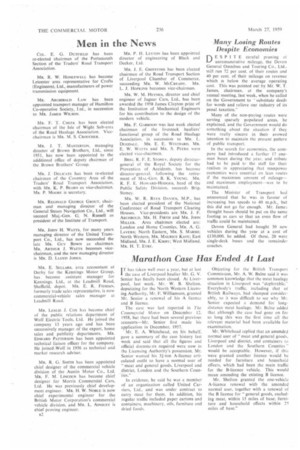Marathon Case Has Ended At Last
Page 36

If you've noticed an error in this article please click here to report it so we can fix it.
IT has taken well over a year, but at last I the case of Liverpool haulier Mr. G. V. Senior has finally been closed. At Liverpool, last week, Mr. W. B. Shelton, deputizing for the North Western Licensing Authority, Mr. F. Williamson, granted Mr. Senior a renewal of his A licence and B licence.
The case was last reported in The Commercial Motor on December 12, 1958, but there had been several previous accounts—Mr. Senior first made his application in December, 1957.
Mr. E. A. Whitehead, on his behalf. gave a summary of the case history last week and said that all the figures and official docume its required were now in the Licensing Authority's possession. Mr. Senior wanted his 31-ton A-licence articulated outfit to have a normal user of "meat and general goods, Liverpool and district, London and the Southern Counties."
In evidence, he said he was a member of an organization called United Carriers, Ltd., and was under contract to carry meat for them. In addition, his regular traffic included paper cartons and containers. machinery, oils, furniture and dried foods.
Objecting for the British Transport Commission, Mr. A. W. Elaine said it was common knowledge that the meat haulage situation in Liverpool was "deplorable.Everybody's traffic, including that o British Railways, had stumped considerably, so it was difficult to see why Mr. Senior expected a demand for longdistance meat haulage. Mr. Balne added that although the case had gone on for so long this was the first time all the relevant material had been available for examination.
Mr. Whitehead replied that an amended normal user of "meat and general goods. Liverpool and district, and containers to London and the Southern Counties' would be acceptable. However, if this were granted another licence would be needed for furniture and household effects, which had been the main traffic for the B-licence vehicle. This would mean amending the existing B licence.
Mr. Shelton granted the one-vehicle A-licence renewal with the amended normal user, together with a renewal of the B licence for "general goods, excluding meat, within 15 miles of base; furniture and household effects within 25 miles of base."




































































































